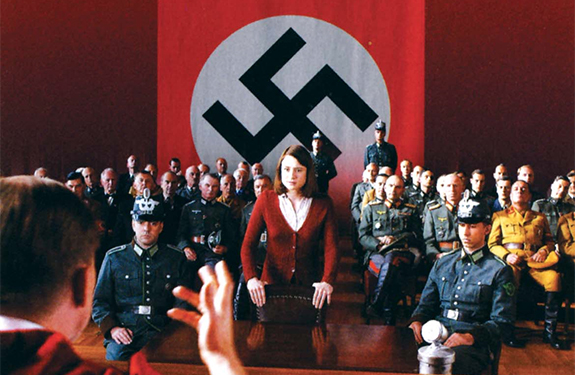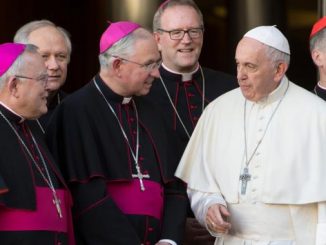
Seventy-five years ago last month, Sophie and Hans Scholl and their friend Christian Probst were executed by guillotine at Munich’s Stadelheim Prison for high treason. Their crime? They were the leaders of an anti-Nazi student organization, the White Rose, and had been caught distributing leaflets at their university in the Bavarian capital; the leaflets condemned the Third Reich, its genocide of the Jews, and its futile war.
How did young people once active in the Hitler Youth come to recognize the evil of the Nazi regime and risk their lives to oppose it?
The 2005 Oscar-nominated film, Sophie Scholl: The Final Days, offers a part of the answer. The garish brutality of the Nazis, not least at its Nuremberg party rallies, was a first hint to serious young people that something was wrong here. The White Rose youngsters were also thinkers, and studied Socrates, Plato, and Pascal under the tutelage of Kurt Huber, a philosophy professor who despised the Hitler regime. The leaflets that were their primary resistance tool included references to Goethe, Aristotle, Schiller, and Lao Tzu – further signs of deep and broad reading.
What you won’t learn from the film, however, is that the triggering inspiration for their activism was the “Lion of Muenster,” Archbishop Clemens von Galen, whose anti-Nazi preaching convinced the members of the White Rose that thought and discussion must give way to action. So, between June 1942 and February 1943, the White Rose produced and distributed six leaflets urging others to nonviolent resistance against the Nazi regime. To stand by silently, they claimed, was to be complicit in “the most horrible of crimes – crimes that infinitely outdistance every human measure.” To do nothing was to truckle to Hitler; and “every word that comes out of Hitler’s mouth is a lie.”
The fourth pamphlet made a promise: “We will not be silent. We are your bad consciences. The White Rose will not leave you in peace.” And therein lies a clue to another inspiration for the Scholls and their friends: John Henry Newman and his writings on conscience.
In Britain’s Catholic Herald, Paul Shrimpton notes that the youngsters of the White Rose were deeply influenced by Augustine’s Confessions and George Bernanos’s Diary of a Country Priest. But it was Newman’s sermons, recommended to the White Rose students by a philosopher who had converted to Catholicism after reading Newman’s Grammar of Assent, which prompted that fourth pamphlet with its call to heed the demanding voice of conscience.
Shrimpton reports that when Sophie Scholl’s boyfriend, Fritz Hartnagel, was assigned to the Russian front in 1942, Sophie gave him two volumes of Newman’s sermons. He later wrote her that “we know by whom we are created, and that we stand in a relationship of moral obligation to our creator. Conscience gives us the capacity to distinguished between good and evil” – words, Shrimpton notes, that “were taken almost verbatim from a famous sermon of Newman’s called ‘The Testimony of Conscience.’” On the witness stand before the notorious Nazi “People’s Court” judge Rudolph Freisler, 21-year old Sophie Scholl testified that it was her conscience, and her Christian conviction, that had led her to nonviolent resistance against Hitler and his gangsters. That Christian conscience, we now know, was formed in part by a serious intellectual and spiritual encounter with Blessed John Henry Newman.
There is a lot of talk in the Church these days about “conscience,” and Newman is invoked by many prominent personalities in those debates. So it might be useful for all concerned, including Church leaders in the Munich where the White Rose youngsters gave their lives for the truth, to ponder Newman’s influence on these contemporary martyrs.
What did the members of the White Rose learn from Newman about conscience? They learned that conscience could not be ignored or manipulated. They learned that the voice of God speaking through our consciences sets before us what is life-giving and what is death-dealing. They learned that conscience can be stern, but that in submitting to the truths it conveys, we are liberated in the deepest meaning of human freedom.
They learned that obedience to conscience can make us courageous, and that to strive to live an ideal with the help of grace is to live a truly noble life with an undivided heart.
If you value the news and views Catholic World Report provides, please consider donating to support our efforts. Your contribution will help us continue to make CWR available to all readers worldwide for free, without a subscription. Thank you for your generosity!
Click here for more information on donating to CWR. Click here to sign up for our newsletter.







The “most horrible of crimes” has become the “legal” murder of nearly two-billion innocent human beings in the last forty years through “legal” abortion. The contemporary, militantly atheistic state has claimed for itself the god-like authority to “legalize” the murder of innocent humanity. For the Church to “do nothing,” or even to fail to respond to this “most horrible of crimes” in a manner commensurate with its urgency, is to burn incense to the self-deified state. It is blatant idolatry.
Just how horrible is the murder of two-billion people? The entire population of the planet at the beginning of the twentieth century was less than two-billion people. Abortion was illegal and was condemned by the traditional Western ethic. What changed? What allowed us to to tolerate the murder of worlds of innocent humanity? Lies. The common acceptance of irrational lies.
What kind of sociopathic buffoonery are we tolerating in the godless social engineering of the self-deified state? To grasp it, consider the following imaginary scenario:
It is the year 1900. The world population is nearly two-billion people. A space-alien is zooming around the galaxy in his spaceship getting in some target practice with his brand new, long-range planet-zapper gun. He has blown up a few dozen rocky, barren planets and now has a tiny speck in the telescopic scope of his gun — a speck we refer to as planet Earth. What would it mean if he blew up planet Earth and went on his merry way? What kind of a sociopathic, ethical midget could do that without having any idea of what it would mean, or what difference it would make?
Our godless social engineers have no more understanding of what they have done, and no more competence to “legalize” murder by billions than did our buffoonish space-alien.
Yes, discussion must give way to action. We would do well to consider a prophetic warning by Archbishop Clemens von Galen:
Anybody who has even the vaguest familiarity with the Bible knows that God eventually punishes idolatry in His people mightily. “Woe to mankind” indeed.